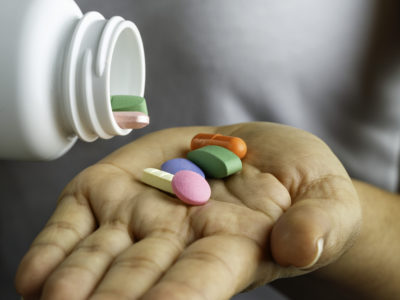Table of Contents[Hide][Show]
“We’re going to need to put you on an antibiotic.”
If you’re like me, you never want to hear a doctor say that. Especially if you’ve been working hard to boost your gut health and stay healthy so you can avoid antibiotics.
I don’t know about you, but immediately after the dreadful sentence above was uttered, I was already on my phone, searching for ways to prevent the possible side effects.
Even though I studied nutrition in college and am a longtime health practitioner, I was still left dumbfounded at all the contradictory information on how to handle antibiotics.
Increasingly, there’s even more confusion around basic questions like: Can you take probiotics while on antibiotics? Will you be killing those probiotics with the prescribed antibiotics?
And if you can take probiotics at the same time as this prescription, which ones actually work?
Even worse, the advice on how to rebuild your gut during and after an antibiotic regimen is pretty treacherous to navigate.
So let’s change that today.
Antibiotics and Gut Health
For starters, let’s get into some of the ways that antibiotics can affect the stability of your gut health.
Antibiotics work in a very simple way: they’re created to kill bacteria.
The problem is, we haven’t yet produced ways to kill only certain bacteria.
So, if you’re taking an antibiotic for a specific bacterial infection, you’re essentially setting off a nuclear bomb in your gut against all of the bacteria in there.
That includes all the good stuff you may have spent years trying to cultivate through probiotics and fermented foods. (Adding insult to injury, the bad bacteria tends to grow back faster than the good.)
To make matters worse, if you’re having a bad reaction to your antibiotic, you’ll probably know it because the side effects are not pretty. Most aren’t dangerous, but others, like a severe allergic reaction will require a trip to the emergency room.
Possible negative drug interactions and common side effects of antibiotics include:
- Decreased immunity (from a variety of mechanisms)
- Altered gut flora balance – This could possibly result in female reproductive flora imbalance, such as yeast infections (directly related to gut flora imbalance)
Antibiotics are also known to cause gastrointestinal issues such as:
- Diarrhea
- Vomiting
- Nausea
- Bloating
- Gas
- Constipation
…and those are just the short-term effects caused by antibiotics.
As many as 1 in 10 people suffer these side effects while on an antibiotic, and as many as 1 in 15 may have allergic reactions to antibiotic use. These reactions can be mild such as a skin rash or hives and can be treated with antihistamines, but some people can have hypersensitivity allergic reactions which can be life-threatening, such as anaphylaxis.
If antibiotics can cause such immediate negative results, what are the longer term ramifications once the prescription is over?
And what happens if you have to repeat your antibiotic use over and over again?
Antibiotics Side Effects from Long-Term Chronic Use
Unfortunately, there are two major problems with antibiotic usage in the Western medical model today.
The first is that there is an over-prescription problem. Healthcare professionals are constantly prescribing many types of antibiotics like penicillin, amoxicillin, and others to millions of people. They prescribe them even for things like the common cold, without thought to look for the root cause that keeps creating repeated infections.
Antibiotic treatment is necessary in treating certain bacterial infections such as urinary tract infections (UTIs), pneumonia, strep throat, and other bodily infections caused by dirty wounds.
However, antibiotics are antibacterial/antimicrobial medication which means they are only effective against serious bacterial infections and diseases. They don’t work against infectious diseases like the cold or flu. These are viral infections, and taking an antibiotic to fight these conditions will actually only make it harder for your body to fight them as they are also killing the good bacteria needed to be healthy.
Antibiotics are also ineffective against fungal infections such as yeast infections and can actually cause them in certain cases.
According to the Centers for Disease Control and Prevention (CDC) it’s also not good medical advice to take antibiotics for most cases of bronchitis, many sinus infections, and some inner ear infections.
And there’s more bad news…
For anyone who has been on antibiotics for long periods of time, there can be some really terrible consequences.
Some serious side effects of prolonged antibiotic use include:
- Antibiotic-resistant bacteria
- Kidney failure
- Colitis caused by Clostridium difficile (a bacterium resistant to most antibiotics)
And those are just some of the top issues. There’s still plenty more research to be done in this arena.
For those falling into the chronic antibiotic use/overuse camp, the possibility of creating antibiotic-resistant bacteria is a very real issue.
How Antibiotic-Resistance Works
You take a round of antibiotics for an infection, but the “bad bacteria” you’re trying to get rid of doesn’t die. The remaining pieces begin to regrow, and it’s highly likely that the antibiotic you used against them the first time will continue to be ineffective.
That’s because bacteria reproduce and adapt at an incredibly fast rate, so if your first round of “weapons” doesn’t kill them, they’ll come back stronger.
This is bad for a couple of reasons.
First, to deal with this bad strain of bacteria, you’ll now have to go on a stronger batch of antibiotics in hopes that that does the trick in kicking the infection out of your system.
And second, you’re now the host of a stronger, more aggressive type of bacteria that people may not be used to.
If, as the host of this stronger strain, you accidentally transfer it to someone else (you do not even need to be symptomatic to do this), now there are two people carrying around a bacterium that takes some pretty heavy-dose prescriptions to eradicate.
This is how drug-resistant “superbugs” come about: one person isn’t completely cleared of their bad bacteria in the first round of antibiotics, and then transfers that stronger strain of bacteria to someone else.
Eventually, the bacteria gets stronger and stronger as higher-power antibiotics fail to kill it off, and then we have a real problem on our hands.
But before we get into how to prevent those superbugs, let’s look at the more common issue of what happens from the one-time use of antibiotics.
3 Chronic Issues from Short-Term Use of Antibiotics
It’s good to keep in mind that many people (luckily) don’t get into the trap of using antibiotics long-term.
However, the second issue in Western medicine regarding antibiotic use is that there’s typically no “rebuild” plan prescribed to repair the damage caused by antibiotics.
And unfortunately, there can also be some long-term effects lingering from antibiotics after just one prescription—especially in those who don’t actively work to maintain a healthy gut.
This is a topic that’s only been researched more recently, but there are a few key findings so far.
Check out the 3 major long-term effects that just one round of antibiotics can have on the body.
1. Epithelial cell death
The first long-term effect of one round of antibiotic use is the killing of epithelial cells.
“Epithelial cells” are the cells used to build our skin, and they’re also the building blocks for our gut. Epithelial cells are responsible for dictating what goes in and out of the body, and what shouldn’t be let in at all.
Recently, studies have shown that antibiotics don’t just stick to killing bacteria, like we previously thought. It turns out that antibiotics are also really good at damaging and completely killing the intestinal epithelial cells, too.
These epithelial cells in the intestines are responsible for nutrient and water absorption into the body, and when they’re damaged, our ability to process what we eat in an effective way is damaged with them. This can lead to issues like leaky gut or malnutrition… Even if you’re “eating all the right things.” That’s because damaged epithelial cells means that you won’t be able to absorb those nutrients you’re working so hard to consume.
Related
What Is Leaky Gut Syndrome And How Does It Affect Your Health?
What is leaky gut syndrome? Learn more about this condition and how it impacts your gut health below RELATED: Why Gut Health Matters More Than You Think What Is Leaky Gut Syndrome and Other FAQs What Is Leaky Gut Syndrome? The term “leaky gut” describes the increased permeability of the intestines. The medical term is …
2. Mitochondrial Disruption
Another issue that antibiotics can cause, even after just one use, is the damaging of mitochondria in the body.
Mitochondria are a type of organelle found within each cell, and they’re responsible for energy production for the whole body.
To say they’re important is an understatement: we wouldn’t be able to function without them, and a sign of aging and disease is under-functioning mitochondria.
This destruction of mitochondria by antibiotics could be due to the fact that they evolved from bacteria themselves. So, the antibiotics target mitochondria and damage them as well as the bacteria you’re trying to get rid of.
So, antibiotics could be unintentionally killing the “powerhouse” of your body’s own cells, leading to more cell death in our own bodies.
And when the mitochondria are damaged, we see the effects of aging and decreased energy at a faster-than-natural rate, which, if left unchecked, can lead to a variety of neurodegenerative diseases.
In effect: antibiotics could literally be killing your body’s chances at living its healthiest, longest life possible.
Related
Genius Foods – 7 Superfoods For Brain Health
What do blueberries, almonds, and dark chocolate all have in common? Aside from tasting great, scientists categorize them as superfoods for brain health! Learn more about genius foods you should be eating.
3. Host-Microbe Signaling Can Be Diminished
Last, but not least, antibiotics can cause miscommunication between the bacteria we want in the gut and the rest of our body.
When our beneficial gut bacteria is plentiful, our health is noticeably better. Signs that you’ve got the good bacteria in your gut include:
- Having a strong immune system
- Regular bowel movements
- No brain fog
- Consistently good sleep
- Generally good energy day to day
But when the bad bacteria outweighs the good, your gut/brain signaling changes…and that can cause all sorts of issues.
A gut with an overgrowth of bad bacteria can lead to disrupted digestion, abdominal pain, poor food absorption, a higher risk for obesity, depression, an increase in allergies, asthma, and even depression.
So, even for the good bacteria that manage to survive the antibiotic use, their functionality could be affected for a longer duration than just the time you’re on the prescription.
Probiotics to Take While on an Antibiotic
Don’t worry, there’s a light at the end of this tunnel!
Now that you know what antibiotics are capable of, how do you go about preventing their ill effects?
Enter: probiotics.
It was mentioned at the top of this article that the use of probiotics while also on an antibiotic is a confusing subject.
Wouldn’t the antibiotic just negate the use of the probiotic?
Most of the time, that answer is “yes.”
But that’s largely because most people simply aren’t taking the right kind of probiotic while on a prescription for an antibiotic.
There are a 2 main types of probiotics out there, coming from different sources:
- Bacteria that’s designed to survive even the harshest conditions
- And those that are not
And within these two main categories, there are a number of different strains available for purchase—all of which are sold as “probiotics.”
However, there’s one strain of bacteria that is best for taking while on an antibiotic, and that’s called bacillus clausii.
The thing that makes this strain different is that it’s got the unique ability to resist the effects of most antibiotics, while also being a beneficial strain of bacteria for our gut. That means it will shield your good gut bugs from the antibiotic attack, so that your gut and overall health takes less of a hit.
To say that’s a rarity is an understatement.
Related
The Best Time to Take Probiotics (Food & Supplements)
Does it matter when you take probiotics to make them more effective? We’ll answer this question with specifics regarding the best time to take probiotics whether they are in food or supplements.
So, should you be taking a probiotic while on an antibiotic?
Yes, but be careful to read the ingredients label to make sure that your probiotic includes bacillus clausii.
This is the most surefire way to know that your body will not only absorb and utilize the probiotic, but that it also has a high chance of allowing the good bacteria to “recondition” the gut to have healthier flora long-term.
If you take the wrong type of probiotic you could get a case of antibiotic-associated diarrhea or c.difficile. These cases aren’t too common, but it’s a risk you definitely want to avoid.
This probiotic supplement from Just Thrive contains the first and most clinically studied over-the-counter bacillus clausii strain available in the U.S.
By supporting and replenishing your gut with healthy bacteria that can survive and thrive, you’re helping yourself two-fold.
First, you’re preventing the short-term effects of antibiotic use that we discussed earlier.
And second, you’re setting yourself up for future gut health and immune strength that you didn’t have before your infection.
So, if you have to take an antibiotic, now you have an action plan.
Just make sure that:
- You’re prepared with a probiotic proven to work if/when you have to take an antibiotic
- You do your best to maintain strong gut health by:
- Eating a healthy diet of gut-friendly foods (and avoiding foods you’re intolerant to) – This can include fermented items on your plate daily (apple cider vinegar, sauerkraut, kombucha, etc)
- Making sure to sleep enough to allow your gut to repair itself
- You completely finish your antibiotic at the dose prescribed, for the length of time you’re told to take it. This prevents the possibility of missing some of that bad bacteria it’s targeting, which would lead to the creation of a drug-resistant strain of that bacteria.
All in all, antibiotics are needed for serious bacterial infections, but don’t ask for them if you have something as simple as a sore throat or runny nose. These things are annoying, but will go away without medication.
As long as you follow these guidelines, you’ll be right back on track with a healthy body and gut in no time!
You May Also Like…







